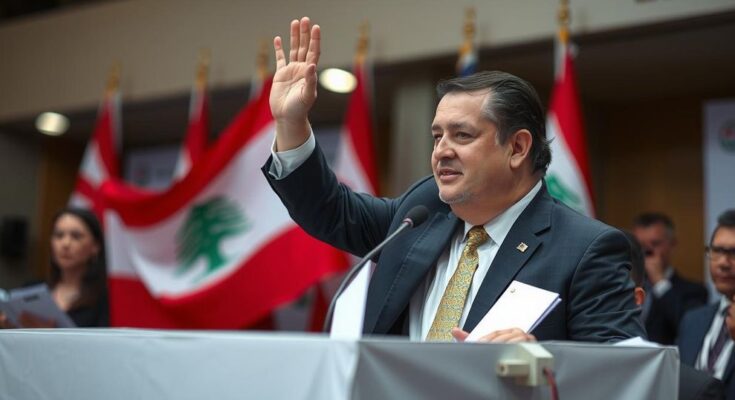The election of General Joseph Aoun as Lebanon’s president marks a notable decline in Hizbullah’s political power, as their preferred candidate withdrew in favor of Aoun, who is backed by international allies. Aoun now faces urgent challenges, including stabilizing a ceasefire with Israel and forming a new government, amidst significant expectations for reform and reconstruction in Lebanon.
The election of General Joseph Aoun as Lebanon’s new president is poised to be a substantial blow to Hizbullah’s political clout, revealing its waning influence within the country. The former commander, now supported by international actors such as the United States, France, and Saudi Arabia, ascended to leadership after Hizbullah’s favored candidate, Suleiman Frangieh, withdrew in favor of Aoun. This outcome signifies both a setback for Hizbullah and a shift in regional dynamics, especially regarding Israel’s military presence.
General Aoun’s administration now faces the immediate task of stabilizing the ceasefire in southern Lebanon, which necessitates the Lebanese army’s active engagement to maintain peace amid Israeli and Hizbullah tensions. Concurrently, Aoun must initiate discussions to form a new government, succeeding the interim administration. Lebanon stands at a crossroads, where reconstruction efforts can be aligned with UN Resolution 1701, offering a chance at substantial recovery.
In light of his election, Aoun has declared aspirations to disband Hizbullah’s military capabilities effectively, a challenge that includes curtailing arms smuggling routes from Syria and blocking Iranian support for Hizbullah. Success in these areas is critical to reinforce his authority domestically; any failure may jeopardize his standing amid political rivals.
The election results reflect considerable external influence compelling a conclusion to Lebanon’s political impasse, despite the array of opposition factions. As he steps into presidency, Aoun’s prospects hinge upon forging fruitful regional and international alliances while confronting ideologically adversarial factions like Hizbullah, which still have substantial grassroots support. Expectations are high from the Lebanese populace for Aoun to incite meaningful reforms, yet the road to stability remains littered with challenges. Thus, Aoun’s leadership may either signify a transformative era for Lebanon or continue its historical narrative of strife.
The election of Lebanon’s new president is pivotal against the backdrop of Hizbullah’s declining political stature and Israel’s military actions in the region. General Joseph Aoun, formerly the commander of the Lebanese army, has gained the presidency after Hizbullah’s failure to secure their candidate’s position, indicating a major shift in Lebanon’s political landscape. This context is crucial as it reflects the interplay of domestic politics, regional influences, and the external pressure on the Lebanese government to initiate reforms and stabilize governance.
In conclusion, General Joseph Aoun’s election as president represents a striking shift in the Lebanese political landscape, signaling Hizbullah’s diminishing influence and fostering expectations of international cooperation for rebuilding efforts. Nonetheless, Aoun faces considerable obstacles from entrenched political factions and will need to effectively manage regional stability and economic recovery while addressing the substantial skepticism surrounding his capacity to curb Hizbullah’s military dominance. The efficacy of his administration will largely determine Lebanon’s trajectory in this transformative period.
Original Source: jcpa.org




